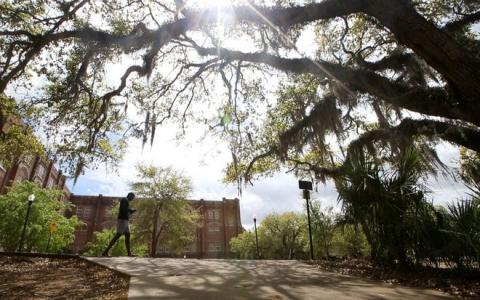Tarah Jean, Deputy News Editor Published 10:33 a.m. ET Jun. 2, 2019
Florida State University campus on Thursday, March 31, 2016. (Photo: Tallahassee Democrat)
On April 14, the Florida State University Faculty Senate passed a resolution advocating for the improvement of sustainability at FSU.
The resolution addresses the need to elevate sustainability to a core strategic goal while also proposing the establishment of a Sustainability Council and a standing Sustainability Committee, which would both work on keeping the university accountable for maintaining ecological balance.
Before the resolution was passed, a sustainability report was published on Mar. 24 to state the vision of increasing the university’s commitment to sustainability through a detailed overview, actionable goals and the role that the faculty would play in the process.
During the meeting that took place for Senate consideration, 86% of the FSU Faculty Senate’s vote passed the resolution.
However, the efforts did not stop there. Faculty members as well as students still have concerns they hope will be addressed by the university.
One of the faculty's concerns is making sure the resolution is promoted as a core strategic goal of the university, according to Faculty Senator Ian MacDonald, the chair of the Faculty Senate Sustainability Committee.
Part of resolving this concern is the implementation of the Sustainability Council, to not only report to the president of FSU, but to also exercise the oversight of progress toward sustainable goals.
“At present, sustainability is not a strategic goal,” MacDonald said, “but we hope the new president will be open to this. Generally, the council would seek to report on progress, opportunities and initiatives and to continue to urge progress in this area.”
The implementation of a Sustainability Committee is another proposal stated in the resolution. The committee provides input and accountability in service of university decision-making as FSU works toward national leadership in sustainability. The committee consists of nine faculty members.
“We hope that the standing Sustainability Committee will ensure continuity of focus and expertise on matters of import to the university. Our committee will… help generate proposals and facilitate transparency and accountability in sustainability governance,” Erin Ryan said.
Ryan is also a faculty senator on the committee who touched on some of the sustainability concerns of faculty members.
“We hope to ensure that relevant university decision-making will take better account of the sustainability implications of each decision, ranging from choices about campus infrastructure to food service to curricular programming,” said Ryan.
Ryan also mentioned the role all members of FSU’s community can play by being more intentional about their own sustainability footprint, making it possible for progress to take place on an individual level as well as an institutional one.
“In the end, we want our community to be one that acts with long-term sustainability in mind, environmentally, socially and economically,” said Ryan.
When it comes to the involvement of students in the efforts of the Faculty Senate, the Faculty Senate was able to have student input contribute to their reports and the resolution to ensure that their voices are also heard. According to Macdonald, student spokespeople will continue to address the recommendations and concerns of advisors who represent the student demographic of the university.
FSU alum Armani Arellano enhanced his commitment to sustainability on FSU's campus through his involvement in Florida Public Interest Research Group (PIRG) Students , the Environmental Service Program (ESP) and more.
“When I was a student at FSU, I made sure to get involved in organizations on campus," Arellano said. "I was the Leadership Intern for Environment Florida at FSU and helped gather support for 100% clean, renewable energy from the entire FSU community.”
Arellano also shared some of the concerns he has from a student’s perspective that can help improve sustainability at the university.
“Working to reduce the number of students who drive cars on campus, for example, by improving other modes of transportation, could be one effective option to decrease greenhouse gas emissions while improving congestion levels,” said Arellano.
After hearing from many individuals who dine at Suwannee Room, another concern of students is having sustainable practices in the dorms and dining halls to reduce plastic usage in those locations, according to Arellano.
While faculty members and students complete the step of establishing the resolution to create more sustainability at FSU, they look forward to seeing more improvements implemented in the near future.
“We very much hope that students generally will be vocal in sharing their support, participation and visions for making FSU the most sustainable campus in the country,” said Macdonald.
Find more information about the university’s current strategic plan, including the plan to Enhance Campus Commitment to Sustainability through the category of Excellence and Reputation, at the 2017-2022 Strategic Plan website .

